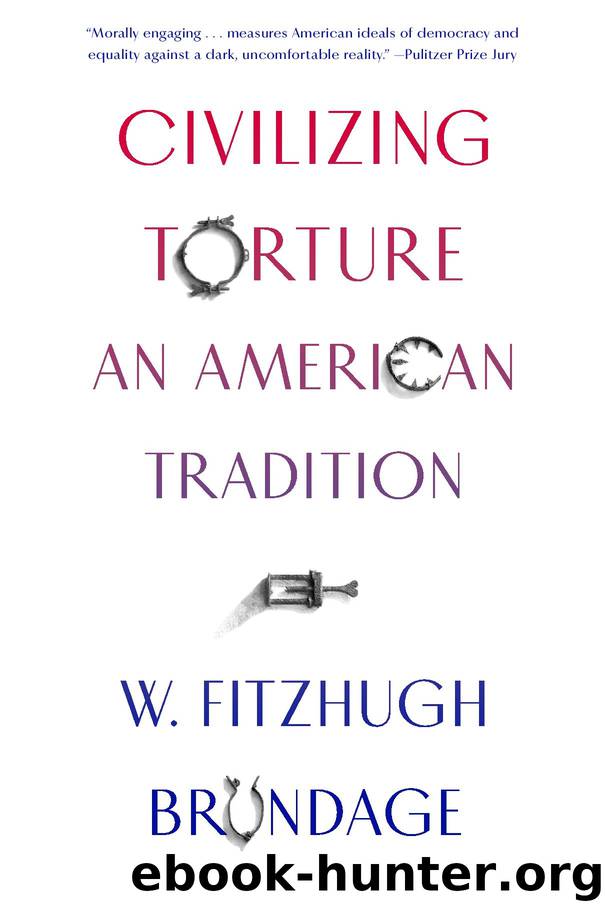Civilizing Torture by W. Fitzhugh Brundage

Author:W. Fitzhugh Brundage
Language: eng
Format: epub
Publisher: Harvard University Press
As the third degree became commonplace and received increasing scrutiny, police sought both to justify it and to shield it from public gaze.33 Police commissioners grumbled that yellow journalists, misinformed do-gooders, and shyster lawyers in the pay of career criminals grossly exaggerated its frequency and intensity. The commissioner of police in Rochester, New York, scoffed at the third degree as a “vague newspaper term,” while an officer in Baltimore claimed that he had “not yet heard anyone explain the exact meaning of the third degree.”34 Likewise, William Baker, the commissioner of police in New York City, mocked “sweating” as an “imaginary something” before claiming that it entailed a battle of wills and a test of intelligence rather than of stamina or tolerance of pain. He protested that “volunteer confessions” and “diligent inquiry of a prisoner for explanation of facts and circumstances” were the sum total of “the so-called ‘third degree.’ ”35 Richard Sylvester, the superintendent of police in the nation’s capital and president of the International Association of Police Chiefs, dismissed “sweating” as “an effervescent term” in the “criminal vernacular.”36 Like other apologists then and later, Sylvester acknowledged that “some years ago a rough usage was resorted to in some cities in order to secure confessions,” but he assured the public that “such procedure does not obtain at large nowadays.”37
For decades to come, police spokesmen would parrot the bromide that the third degree was an archaic practice that had been superseded by modern scientific methods. In an editorial dripping with sarcasm, the Chicago Tribune in 1910 predicted that the Washington police chief would deny that the third degree was administered in his city, but that “it may be in some large cities.” If the chief of police in Philadelphia was interviewed, he would say that “there was nothing of the kind there, but that there might be in New York.” Police officials there would proclaim their innocence while referring the interviewer to Chicago, and on and on.38 If the pronouncements of police were to be believed, the third degree was always practiced elsewhere by someone else.
Even newspapers that periodically published exposés of the third degree routinely dissembled about and excused police methods. For example, in a lengthy article the Chicago Tribune wrung its hands over the police’s penchant for holding suspects incommunicado for days and employing rough methods of interrogation, before dismissing “the wild stories” told about “the brutal manner in which prisoners are bulldozed.”39 A decade later, the same newspaper groused that despite the effectiveness of the strenuous methods used by police, the public “did not take kindly to the idea of confessions extorted by the thumbscrew, the rack, the knout [whip], or their equivalents.”40
Download
This site does not store any files on its server. We only index and link to content provided by other sites. Please contact the content providers to delete copyright contents if any and email us, we'll remove relevant links or contents immediately.
Cecilia; Or, Memoirs of an Heiress — Volume 1 by Fanny Burney(32558)
The Great Music City by Andrea Baker(32019)
Cecilia; Or, Memoirs of an Heiress — Volume 2 by Fanny Burney(31956)
Cecilia; Or, Memoirs of an Heiress — Volume 3 by Fanny Burney(31942)
We're Going to Need More Wine by Gabrielle Union(19046)
All the Missing Girls by Megan Miranda(16029)
Pimp by Iceberg Slim(14508)
For the Love of Europe by Rick Steves(14121)
Bombshells: Glamour Girls of a Lifetime by Sullivan Steve(14076)
Talking to Strangers by Malcolm Gladwell(13370)
Norse Mythology by Gaiman Neil(13365)
Fifty Shades Freed by E L James(13241)
Mindhunter: Inside the FBI's Elite Serial Crime Unit by John E. Douglas & Mark Olshaker(9343)
Crazy Rich Asians by Kevin Kwan(9292)
The Lost Art of Listening by Michael P. Nichols(7506)
Enlightenment Now: The Case for Reason, Science, Humanism, and Progress by Steven Pinker(7314)
The Four Agreements by Don Miguel Ruiz(6765)
Bad Blood by John Carreyrou(6622)
Weapons of Math Destruction by Cathy O'Neil(6281)
